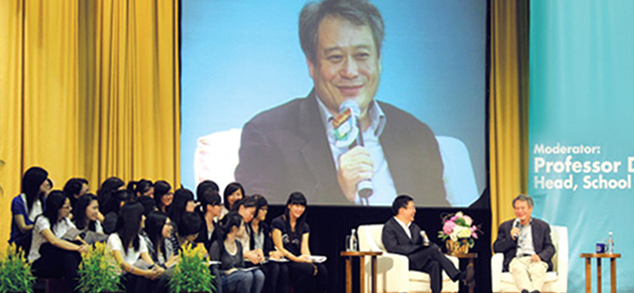HKU's Main Building may be the grandfather on campus, but to Ang Lee its tiled floors and wide, arched balconies resonate with the innocence of society before war and revolution brought radical change. That made it the perfect setting to film the early scenes in Lust, Caution, based on Eileen Chang's short story, which deals with espionage and dark sexual lust during the Japanese occupation of China.
"It's very hard to find a place like this, in Hong Kong or anywhere, where you can totally devote yourself to the age of innocence. The courtyards, the hallways – the place hasn't changed. It's really a place of innocence. The sense of innocence and innocence lost is a common theme that appears in just about all the films I've made," Lee said.
Lee's own innocence stretches back to the moment when he discovered his love of the theatre, an experience he found echoed in Chang's story. He had disappointed his father by failing the university entrance exams twice, and went to an arts college where he tried out the stage.
"I was facing darkness and as the spotlight hit my eyes, I remember my eyelid kind of sparkling. It was a magical, electrifying moment for me and I knew my life would be changed. I belonged to somewhere out there and not in real life. After that I was in a state of shock. I went out that night eating with my friends, walking and singing in the drizzling rain. It was exactly the same picture as the scene in Eileen Chang's story," he said.
"One of the reasons I made the film was because of how much she loved the stage, how much she loved that illusional world which is more truthful than the real world. In some ways I believe in movies more than I do in real life.
"Only through pretending, through acting, do you actually get in touch with the true self. Which is a fascinating idea. It's kind of existential, a yin-yang thing. Maybe the negative space is more truthful because it doesn't have matter, it doesn't change. Maybe something fixed on celluloid is more permanent."
He does not elaborate on the loss of innocence in his life, but it is fair to say the reaction in Asia to Lust, Caution bit hard. There were strong opinions, negative and positive, and Lee felt the weight of them.
"For me a strong response is a good thing because I think the movie is disturbing, provocative, it really challenges our collective consciousness, our karma together, our history. I think patriotism, the group structure, is something we so much rely on as being Chinese.
"[But] I got crushed by the expectations and thinking psychologically that I was facing the whole Chinese community, so to speak. It pushed 10 times more nerves than portraying an American gay couple," a reference to Brokeback Mountain, for which Lee won the Best Director Oscar in 2006.
One of the problems was that, for a change, Lee was an insider to the subject he was filming by virtue of being Chinese. He usually prefers to describe himself as an outsider – a Taiwanese director based in the US who grew up on an island far from his parents' home villages in China.
"As an outsider, you see things differently. You want to be honest with yourself, you want to make a statement, you want to be truthful. What an outsider doesn't have is narcissism. When I make a Chinese film I have some of that and I have to deal with it. It's harder to break through with some true statement. Making American films is much easier," he said.
Being an outsider also helps in, of all things, love. "My closest feeling to love is actually quite abstract. It's a lot like Brokeback Mountain. You find yourself chasing the meaning of it, trying to get a clear picture of it, but you can never find it. The more you're confused, the more romantic and grand it is. That's how I believe in love. I think if we knew what love was, we would have stopped making love stories 3,000 years ago. Being an outsider, not knowing what love exactly is, that's okay. I like being able to watch things in the mist."
Lee was in Hong Kong for the opening of his latest film, Taking Woodstock. He is currently making a movie based on the book, The Life of Pi.  |
